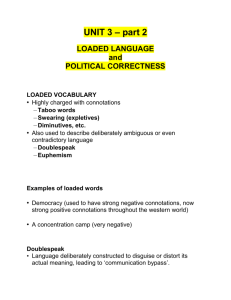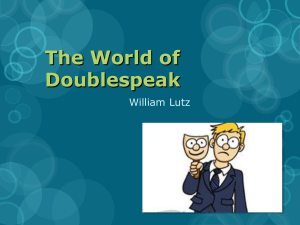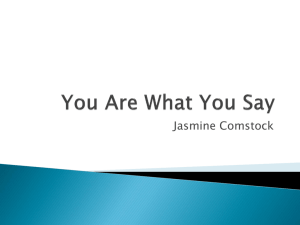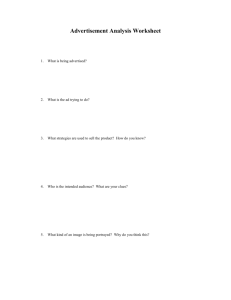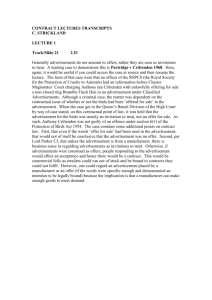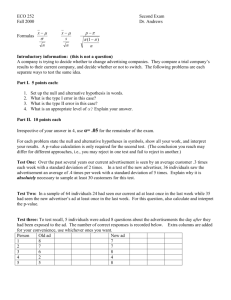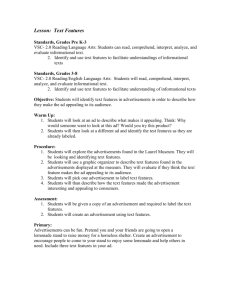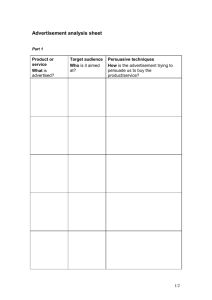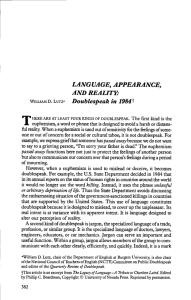CHAPTER ONE INTRODUCTION
advertisement
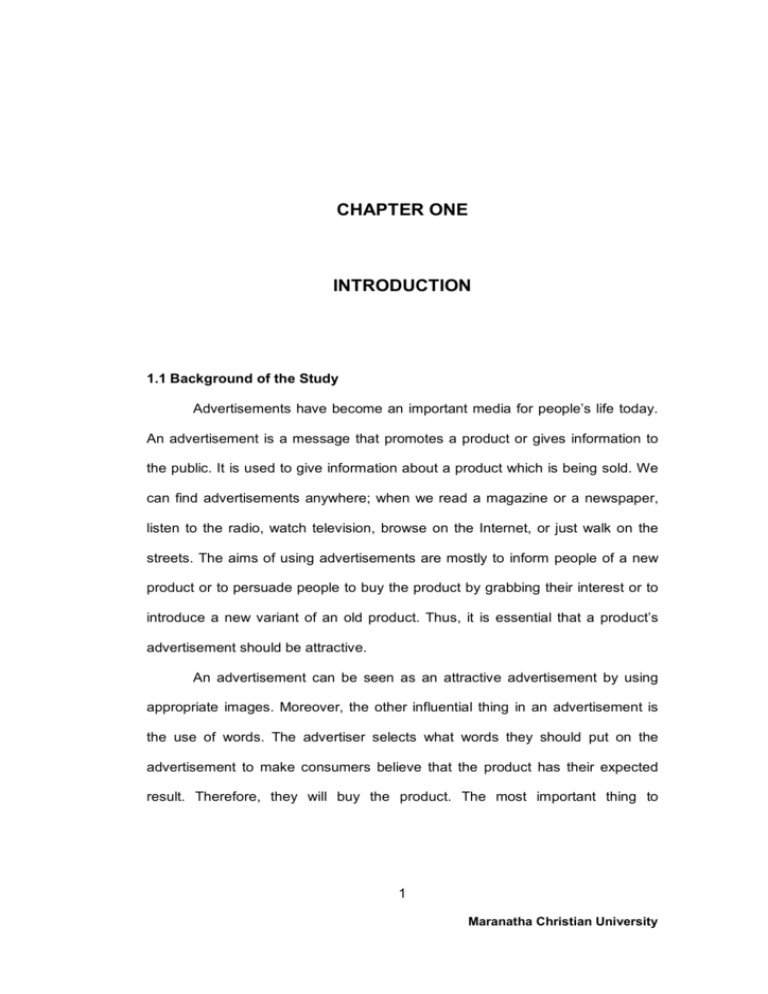
CHAPTER ONE INTRODUCTION 1.1 Background of the Study Advertisements have become an important media for people’s life today. An advertisement is a message that promotes a product or gives information to the public. It is used to give information about a product which is being sold. We can find advertisements anywhere; when we read a magazine or a newspaper, listen to the radio, watch television, browse on the Internet, or just walk on the streets. The aims of using advertisements are mostly to inform people of a new product or to persuade people to buy the product by grabbing their interest or to introduce a new variant of an old product. Thus, it is essential that a product’s advertisement should be attractive. An advertisement can be seen as an attractive advertisement by using appropriate images. Moreover, the other influential thing in an advertisement is the use of words. The advertiser selects what words they should put on the advertisement to make consumers believe that the product has their expected result. Therefore, they will buy the product. The most important thing to 1 Maranatha Christian University communicate effectively with the consumers is to use particular words in advertisements. One of the ways of communication is using what is known as doublespeak. According to Lutz, doublespeak happens when the words used mislead the people who read them. In other words, when using doublespeak, one is making a misleading claim about something (Lutz 2). This is often done in an advertisement by an advertiser because the advertiser wants to make the products look more attractive and more interesting so that the consumers will think that the products are really what is stated in the advertisement. The use of doublespeak helps an advertiser to make the product seem as if it were a really useful and helpful product, it can make everything become better than before. Most advertisers try to make the product seem better than any other products that are on the market. Doublespeak is something commonly used in advertising. Therefore, it is important for the consumers to be aware of the exact meaning of each word which is used in advertisement in order that the consumers will not be misled. These cases are the problems that I will analyze in my thesis. To analyze them, I use four types of doublespeak by William Lutz in his book Doublespeak, namely, the rule of the parity, weasel words, up to claim and unfinished word which have differences in function (83-95). These types of doublespeak can help me reveal what words are frequently used and find out what the real meaning of each word in an advertisement. The rule of parity is used by the advertiser to make the consumers believe that his product is superior to others while in fact it is just the same as the others. Then, the advertiser may use weasel words in his advertisement to create an image that a product seems to be miraculous but in 2 Maranatha Christian University reality it is not. Then, the advertiser may also use up to claims. Up to actually illustrate an ideal situation that is, the product will give the ideal result in an ideal situation. However, the problem is that we will never be in an ideal situation. Finally, the advertiser use unfinished word to let the consumers think better result which is right according to them. In fact, the product does not say anything nor better than other product. In this thesis, I decide to take some Olay advertisements as the source of my data. I am interested in Olay advertisements because Olay is one of the leading cosmetics brands globally. It has been trusted by women for a long time because it offers strong performance at a good value which brings a healthy and beautiful skin and helps women look and feel beautiful. It not only offer the product but it also promises safety and health for the costumer’s skin. Since the 1950’s until now, Olay still exists in international marketing and Olay also has been producing many products. Thus, many women use this product (“History of Olay”). I am interested in analyzing this topic because I want to show that Olay frequently uses doublespeak in its advertisements. Therefore, my topic is Analysis of Doublespeak in Two Olay Advertisements. I believe this topic is significant as people can be made more aware of the presence of doublespeak in advertisements. They should realize that an advertisement is only a tool to sell a product; hence, what is said in the advertisement may not be what it seems to be. Some words are intended to mislead the consumers: words which appear to be very promising but which in fact promise nothing. Words: 728 3 Maranatha Christian University 1.2 Statement of the Problem In this thesis, there are three problems I am going to analyze: 1. What words contain doublespeak in two Olay advertisements? 2. What types of doublespeak are used in the Olay advertisements? 3. How do those words mislead the consumers? 1.3 Purpose of the Study This thesis is done to show the following points: 1. To identify what words contain doublespeak in two Olay advertisements. 2. To classify the word which contain doublespeak according to its function. 3. To show how those words mislead the consumers. 1.4 Method of the Research The first step in doing this research is browsing some pictures of Olay advertisements on the Internet. The next step is selecting the words or phrases containing doublespeak. The third step is analyzing the data by applying the theory. The last step is writing the research report. 1.5 Organization of the Thesis In this thesis there are four chapters. Chapter One, the Introduction, consists of the Background of the Study, Statement of the Problem, Purpose of the Study, Method of the Research, and Organization of the Thesis. Chapter Two 4 Maranatha Christian University is Theoretical Framework, in which I give some explanation about the linguistic area and the approach used in writing the thesis. Chapter Three contains the analysis of the text, and the last chapter is the Conclusion of the analysis. At the end, I put the Bibliography and Appendix. 5 Maranatha Christian University
